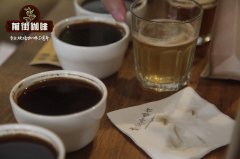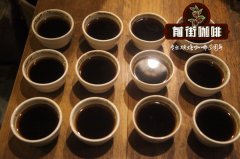What are the basic substances of Taiwan coffee beans?
What are the basic ingredients of Taiwan coffee beans:
Water content:
The moisture content of Taiwan coffee beans will vary greatly according to the processing procedures of the processors themselves. The water content of raw coffee beans with membrane tide is about 50%, while that of dried coffee beans is about 1013% (normal standard). The water content of roasted coffee beans is about 5%, and the presence of moisture in coffee beans will affect the hydration system macromolecules of coffee beans, such as protein, polysaccharides, glycogen acid, etc. Water is found in a variety of physical and chemical combinations in raw coffee beans.
Mineral ores:

The content of mineral minerals in coffee beans accounts for about 4% of the weight of dried coffee beans, and it contains a number of different elements, of which the total amount of iron accounts for up to 40% of all minerals, which are iron, calcium, phosphorus, phosphorus, sulfur, etc., and many other trace elements with a content of one-hundredth of a fraction of a time. During the coffee cooking process, at least 90% of the mineral cacao beans are released during roasting.
Carbohydrates:
The carbohydrates contained in Taiwan coffee beans can be divided into carbohydrates such as polysaccharides, low molecular weight carbohydrates, monosaccharides and triosaccharides, as well as reducing sugars, non-reducing sugars and derivatives. the effect of carbohydrates on coffee lies in its taste, aroma and color. The carbohydrates of coffee beans will dissipate the aroma of coffee during roasting, and at the same time, they will also absorb sporadic flavors, making the coffee produce a special flavor after roasting.
Low molecular weight carbohydrates:
Sucrose is the most important free carbohydrate in raw coffee beans, and its content varies according to variety, source and maturity.
The sugar content of Taiwan coffee beans is higher than that of imported beans, and the glucose and fructose of Taiwan coffee beans are also higher than those of imported beans. "that's why Taiwanese coffee is sweeter than coffee."
The degradation of low molecular weight carbohydrates varies according to the roasting degree of coffee beans. The loss of sucrose is the fastest, and the deeper the roasting degree is, the more sugars are lost. "Why do heavy-roasted coffee beans taste bitter, but there are no protein sugars?"
Polysaccharides:
Polysaccharides are very important principal components in coffee beans, accounting for 50% to 60% of the dry matter. According to the category, there are polymerized galactose, polymeric mannose, polymerized vitamin, which are the substances that form coffee beans, and are related to the hardness of raw coffee beans.
The degree of retention of polysaccharides in Taiwan coffee beans during baking is not much different from that of roasting, ranging from 60% to 80%.
Fruit and lignin:
Fruit is composed of a variety of polysaccharides, mainly composed of galactoic acid polymer, with a content of more than 4%. Lignin is an insoluble residue left over from the use of sulfuric acid and caustic treatment by plants, also known as coffee cake, with a content of about 23%.
Nitrogenous compounds:
The nitrogen compounds in Taiwan coffee beans can be divided into plant, fumarate, nicotinic acid, protein, amino acid, protogenic acid, lipids, organic acid, caffeine and so on.
Important Notice :
前街咖啡 FrontStreet Coffee has moved to new addredd:
FrontStreet Coffee Address: 315,Donghua East Road,GuangZhou
Tel:020 38364473
- Prev

Coffee flavor consists of three dimensions: aroma, taste and taste.
Coffee flavor includes aroma, taste and taste three dimensions, need to mobilize the sense of smell, taste and touch to experience, for example, the sour, sweet and bitter mentioned in the question are taste, while alcohol involves touch. Han Huaizong's "Fine Coffee" gives a comprehensive and logical introduction to the composition of coffee flavor, which has just been reviewed and transported for your reference.
- Next

What is the COE Excellence Cup? How to participate in the COE Coffee Cup Test
Professional coffee knowledge exchange more coffee bean information please follow the coffee workshop (Wechat official account cafe_style) Cup Of Excellent (referred to as COE), similar to Taiwan tea or French wine competition, is an annual coffee competition held in many coffee-producing countries to identify high-quality coffee, organized by the Coffee Excellence Alliance (Alliance for)
Related
- Beginners will see the "Coffee pull flower" guide!
- What is the difference between ice blog purified milk and ordinary milk coffee?
- Why is the Philippines the largest producer of crops in Liberia?
- For coffee extraction, should the fine powder be retained?
- How does extracted espresso fill pressed powder? How much strength does it take to press the powder?
- How to make jasmine cold extract coffee? Is the jasmine + latte good?
- Will this little toy really make the coffee taste better? How does Lily Drip affect coffee extraction?
- Will the action of slapping the filter cup also affect coffee extraction?
- What's the difference between powder-to-water ratio and powder-to-liquid ratio?
- What is the Ethiopian local species? What does it have to do with Heirloom native species?

